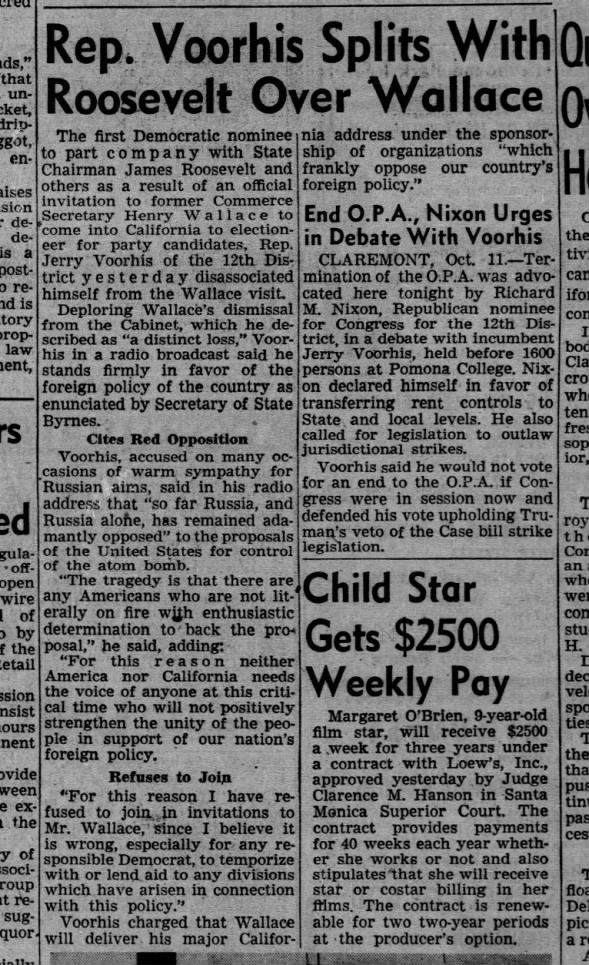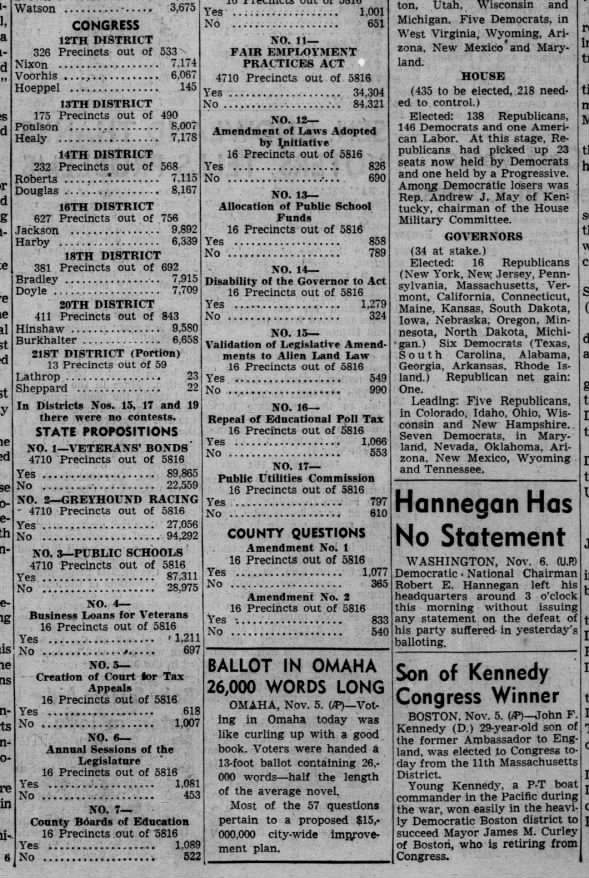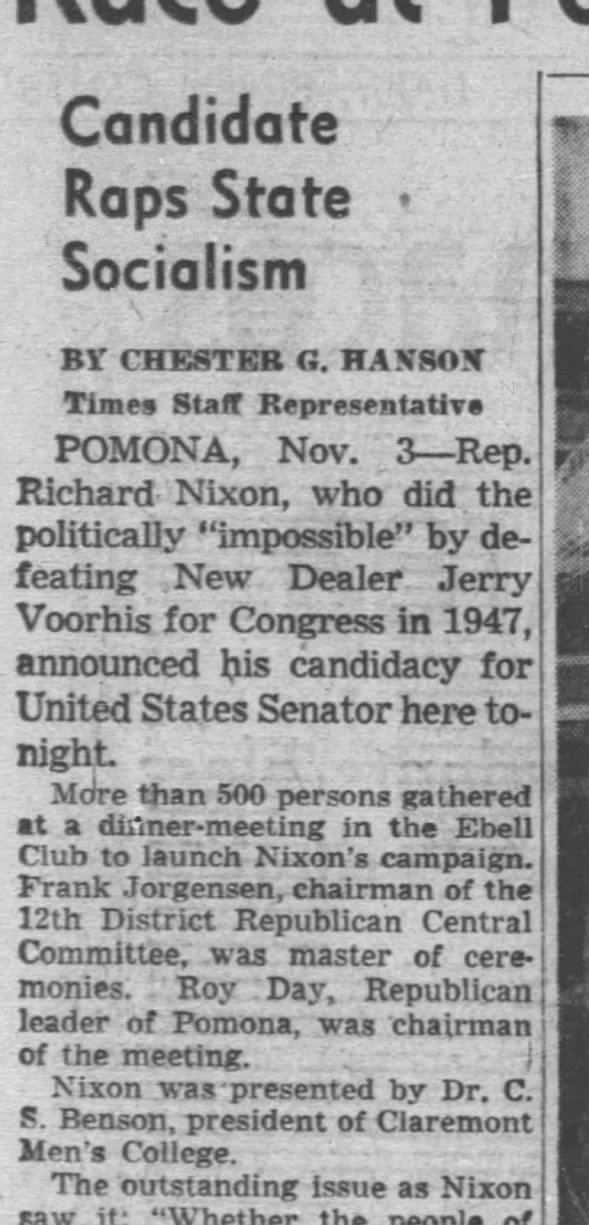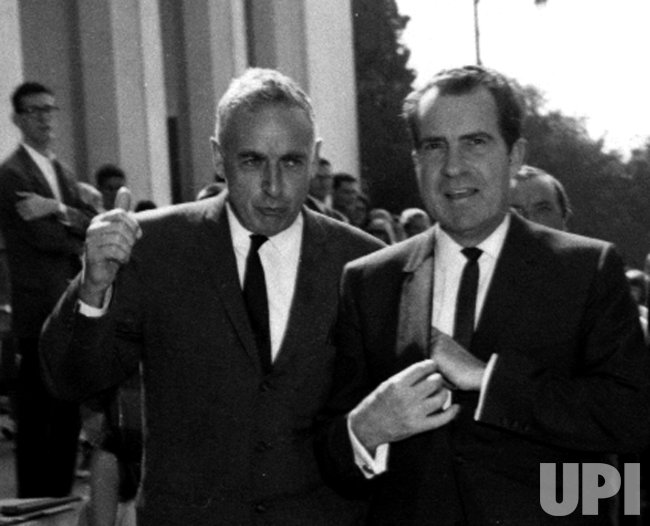Cases in American Political Leadership: Richard Nixon
CMC Government 124A Spring 2021
Tue, Thu 11 AM- 12:15 PM Pacific
Office hours: email for a time.
Email: jpitney@cmc.edu Web:
http://www1.cmc.edu/pages/faculty/JPitney/GeneralRichard M. Nixon, the House member representing Claremont, entered the national arena in 1947. He stayed there until his death in 1994. Few political leaders have cast such a long shadow: his 47 years of political activity covered more than one-fifth of U.S. history. During those years, he left his mark on electoral strategy, foreign and domestic policy, economics, governmental institutions and, of course, political ethics. In this course, we shall see how he has shaped American politics through the present day, His career will serve as a case study of how a political leader gains, exercises, and loses power. It will also be a case study in the complexity of political character. He started his career as an anticommunist, and went on to negotiate with the People's Republic of China and the Soviet Union. He made deeply prejudiced comments about Jews and African Americans, yet saved Israel in 1973 and extended affirmative action. He called himself a conservative but imposed peacetime wage-price controls, and proposed a guaranteed wage and national health insurance. And he was an intensely private man who bared his soul on audiotape.
ClassesClasses will include lecture and discussion. Finish the readings before class because our discussions will involve those readings. We shall also talk about Nixon's relationship to current affairs, so you must read a good news source such as
Politico,
RealClearPolitics or the
New York Times.
BlogOur class blog is at
https://gov124.blogspot.com/. I shall post videos, graphs, news stories, and other material there. We shall use some of this material in class, and you may review the rest at your convenience. You will all receive invitations to post to the blog. (Please let me know if you do not get such an invitation.) I strongly encourage you to use the blog in these ways:
- To post questions or comments about the readings before we discuss them in class;
- To follow up on class discussions with additional comments or questions.
- To post relevant news items or videos.
GradesThe following will make up your course grade:
- Three 4-page essays: 20% each
- One 6-page research paper: 25%
- Class participation, blog: 15%
Details
- The papers will develop your research and writing skills, and test your comprehension of class materials In grading your papers, I will take account of the quality of your writing, applying the principles of Strunk and White’s Elements of Style. If you object to this approach, do not take this course, or anything else that I teach.
- The research paper will give you an opportunity to delve into scholarly and primary sources. Students will make very brief oral presentations on their topics.
- Class participation will hone your ability to think on your feet, as I shall call on students at random. If you often miss class or fail to prepare, your grade will suffer. I shall use the cold calls to judge how well you are keeping up with the material. If you object to this approach, do not take this course. I also expect you to post relevant material to the blog.
- Before each week's Thursday class, email me your reactions to that week's readings. In these emails, you may describe the overall theme of the readings, identify important information or concepts that you have learned, or raise questions or criticisms. These emails should be short -- two or three sentences will be fine -- but they will provide me with a good sense of what you are getting out of the course readings.
- In addition to the required readings (below), I may also give you emails and web links covering current events and basic factual information.
- Because constructive disagreement sharpens thinking, deepens understanding, and reveals novel insights, I encourage and expect it. All viewpoints are welcome here, and no ideas are immune from scrutiny and debate. Your opinions will not affect your grade, as long as you can back up what you say. See this statement: https://heterodoxacademy.org/teaching-heterodoxy-syllabus-language/
- Check due dates. Plan your schedule accordingly. Do not plan on extensions.
- Plagiarism and other forms of academic dishonesty hurt fellow students. Please study our Statement of Academic Integrity, which reads in part: "The faculty of Claremont McKenna College is firmly committed to upholding the highest standards of academic integrity. Each faculty member has the responsibility to report cases of academic dishonesty to the Academic Standards Committee, which has the duty of dealing with cases of alleged academic dishonesty."
- Students who need accommodations for documented disabilities should contact Disability Support Services. You may find more information here: https://www.cmc.edu/dean-of-students/disability-support-services
Required Books- Joan Hoff, Nixon Reconsidered (New York: Basic Books, 1994).
- Christopher Matthews, Kennedy and Nixon: The Rivalry That Shaped Postwar America (New York: Touchstone, 1997).
- Michael Nelson, Resilient America: Electing Nixon in 1968, Channeling Dissent, and Dividing Government (Lawrence, Kansas: University Press of Kansas, 2014).
- Douglas E. Schoen, The Nixon Effect: How Richard Nixon's Presidency Fundamentally Changed American Politics (New York: Encounter, 2016)
Schedule (subject to change, with notice)
Jan 27, 29: Introduction“I saw both greatness and meanness in Nixon in such bewildering combination that, years later, peering out of a hotel window at the White House which I had been forced to leave, I muttered out loud: ‘Nixon was the weirdest man ever to live in the White House.’" --
H.R. Haldeman- Hoff, introduction
- Schoen, introduction
- Matthews, introduction
Feb 2, 4: Young Men in a Hurry"To test him, Day invited students from all-female Scripps College to a coffee. They sat in a circle on the floor, interrogating Nixon, who responded, to Day's great relief, by taking each pointed question, complimenting the questioner, and tugging the women toward his position without being confrontational." -- John A. Farrell,
Richard Nixon: The Life.
FIRST ESSAY ASSIGNED FEBRUARY 4, DUE FEBRUARY 19. READ STRUNK AND WHITE FIRST
Feb 9, 11: Kennedy v. Nixon"And I can only say that I'm very proud that President Eisenhower restored dignity and decency and, frankly, good language to the conduct of the presidency of the United States. And I only hope that, should I win this election, that I could approach President Eisenhower in maintaining the dignity of the office; in seeing to it that whenever any mother or father talks to his child, he can look at the man in the White House and, whatever he may think of his policies, he will say: "Well, there is a man who maintains the kind of standards personally that I would want my child to follow." --
Richard Nixon, debate with JFK, October 13, 1960. Feb 16, 18: Wilderness"You won't have Nixon to kick around any more, because, gentlemen, this is my last press conference..." --
Richard Nixon, November 7, 1962- Matthews, 15-19
- Nelson, ch. 1-2
Feb 23, 25: Comeback
"Nixon hates psychiatrists. He's got this thing, apparently. They make him very very nervous. You should have heard him on the phone when I told him I had one on the panel. Did you hear him? If I've ever heard a guy's voice turn white, that was it." -- Roger Ailes, organizing a TV panel for the 1968 campaign, quoted in The Selling of the President 1968.
Nelson, ch 3-5
SECOND ESSAY ASSIGNED FEBRUARY 25, DUE MARCH 19Mar 2, 4: The 1968 Election"Or some of our folks, including some of the old China Lobby, are going to the [South] Vietnamese embassy and saying, `Please notify the President [Thieu] that if he’ll hold out till November the 2nd they could get a better deal.' Now, I’m reading their hand, Everett. I don’t want to get this in the campaign. And they oughtn’t to be doing this. This is treason." --
President Lyndon Johnson to Senate GOP Leader Everett Dirksen, November 2, 1968- Nelson, ch. 6-8
- Matthews. ch. 20
Mar 9, 11: SPRING BREAKMarch 16, 18: The Nixon White House
"The Jews have certain traits. The Irish have certain — for example, the Irish can’t drink. What you always have to remember with the Irish is they get mean. Virtually every Irish I’ve known gets mean when he drinks. Particularly the real Irish.”
-- Richard Nixon to Chuck Colson, February 13, 1972March 23, 25: The Domestic Presidency"You know, the truth of the matter is when you look at some of my policies, in a lot of ways Richard Nixon was more liberal than I was. [He] started the E.P.A, you know, started a whole lot of the regulatory state that has helped make our air and water clean."
--President Barack Obama, February 3, 2014.- Hoff, ch 3-4
- Schoen, ch. 1
March 30, Apr 1: Diplomacy"Mr. Richardson recalls that the first thing Mr. Nixon said when he entered the Oval Office to resign was a reference to Leonid I. Brezhnev, the Soviet leader. `Brezhnev would never understand it if I let Cox defy my instructions,' the President declared." --
NY Times, 4/12/76- Hoff, ch. 5-6.
- Schoen, ch. 2.
April 6, 8: A Wartime President
Richard Nixon: "[B]ecause I look at the tide of history out there—South Vietnam probably can never even survive anyway. I’m just being perfectly candid...."
Henry Kissinger: "...So we’ve got to find some formula that holds the thing together a year or two, after which—after a year, Mr. President, Vietnam will be a backwater. If we settle it, say, this October, by January ’74 no one will give a damn." --
August 3, 1972April 13, 15: CREEP and the Parties"I want the most, I want the most comprehensive notes on all of those that have tried to do us in. Because they didn't have to do it. They didn't have to do it. I mean, if the thing had been a clo -- uh, they had a very close election everybody on the other side would understand this game. But now they are doing this quite deliberately and they are asking for it and they are going to get it.." --
Richard Nixon to John Dean, September 15, 1972 RESEARCH PAPER DUE APRIL 16
April 20, 22: Downfall
"In his conduct of the office of President of the United States, Richard M. Nixon, in violation of his constitutional oath faithfully to execute the office of President of the United States and, to the best of his ability, preserve, protect, and defend the Constitution of the United States, and in violation of his consitutional duty to take care that the laws be faithfully executed, has prevented, obstructed, and impeded the administration of justice..." -
First article of impeachment, 1974THIRD ESSAY ASSIGNED APRIL 20 DUE MAY 7
April 27, 29: Downfall and Return"[A]lways remember, others may hate you, but those who hate you don't win unless you hate them, and then you destroy yourself." --
Nixon farewell remarks, August 9, 1974- Schoen, ch. 9-10
- Matthews, epilogue
- Hoff, conclusion
May 4, 6: Legacy
"Two thousand years ago, the poet Sophocles wrote, `One must wait until the evening to see how splendid the day has been.' There is still some time before the sun goes down, but even now, I can look back and say that the day has indeed been splendid."
- Schoen, ch. 7-8, and afterword










